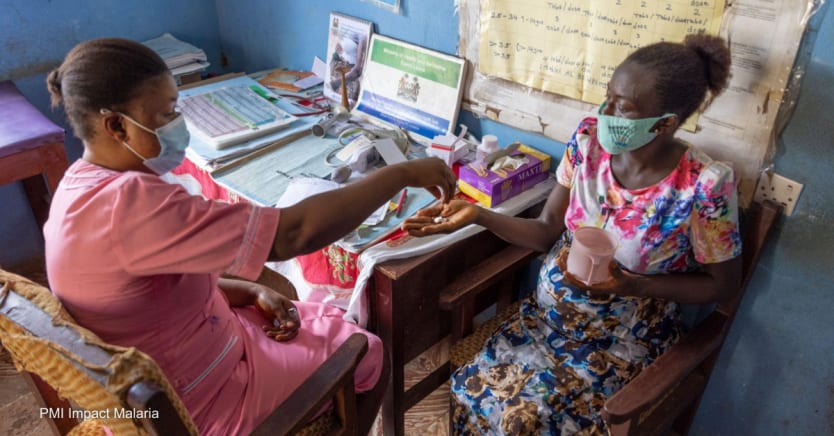
July 31 marks Pan-African Women’s Day, a day that celebrates the value of women as “a powerful untapped economic force” in Africa. However, challenges to African women’s health and well-being are still inhibiting them and their nations from realizing their full potential. To achieve the Sustainable Development Goals, the health of African women and girls must be at the top of every national agenda. As 96% of global malaria deaths occur on this continent — with 80% of deaths in the region among children under 5 — equipping women with the tools to protect themselves and their children from this deadly disease is critical to ensuring they can play a pivotal role in Africa’s future.
A heavy burden on an underserved population
As patients and caregivers, African women and adolescent girls disproportionately bear the brunt of malaria. In pregnancy, they are particularly vulnerable to the disease, creating a significant public health problem.
In 2020, more than one-third of the estimated 33.8 million pregnant women in Africa’s malaria-endemic countries were infected with the disease, resulting in 819,000 children with low birth weight, which can lead to early death and lifelong disability. Malaria in pregnancy contributes to 20% of all stillbirths in sub-Saharan Africa, which translates to roughly 164,000 malaria-related stillbirths in 2019. Globally, the disease leads to 10,000 maternal deaths each year.
“For too long the fight against malaria has been gender blind. It is time to address the hidden burden of malaria on women and girls.” That is according to Ellen Johnson Sirleaf, the former president of Liberia and co-chair of the End Malaria Council, speaking in October 2021 on the occasion of the International Day of the Girl Child. Now is the time to prioritize the needs of millions of pregnant women and girls at risk of malaria and radically improve their health. Governments and communities must make sure that women affected by malaria get the appropriate health services they need.
Effective tools exist, but access is a barrier
Once pregnant women are infected with malaria, it is vital they receive prompt diagnosis and effective treatment. Yet powerful, simple, cost-effective tools to prevent them from getting malaria are available and can save lives.
The World Health Organization advises all pregnant women in malaria-endemic areas to sleep under an insecticide-treated bed net; it also recommends intermittent preventive treatment in pregnancy, or IPTp — a minimum of three doses of sulfadoxine-pyrimethamine, SP, starting in the second trimester and given at least one month apart. IPTp-SP cuts neonatal mortality, the number of babies born with low birth weight, and maternal anemia, associated with a higher risk of maternal death. WHO recently expanded eligibility criteria of IPTp-SP to include all pregnant women in malaria endemic areas, rather than just those in their first and second pregnancies, so more women can now be reached with this life-saving treatment.
The benefits of IPTp-SP are irrefutable: If just the first dose was administered to all pregnant women visiting antenatal care clinics, 45,000 fewer children would be born with low birth weight. This figure would rise to 206,000 if 90% of all eligible women received all three doses. If global targets are met and all eligible women receive the recommended three doses of IPTp, many lives of women and children will be saved.
Despite this evidence, pregnant women continue to be neglected. Although IPTp-SP uptake has improved slowly over the past decade, it is low compared to other malaria-control interventions. In 2020, more than two-thirds of eligible African women did not receive the three vital doses of IPTp-SP due to gaps in coordination, policy, human resources, supply, and service delivery.
Reasons to be hopeful
Our partnership
Adding your signature to this letter will build on the strength and commitment of our partnership.
Speak Up Africa, Impact Santé Afrique, Medicines for Malaria Venture, and many other organizations have worked with the the RBM Partnership to End Malaria and its Malaria in Pregnancy working group to disseminate the appeal and urge global and national leaders to increase IPTp coverage by providing at least three doses of IPTp-SP to all eligible pregnant women in Africa’s malaria-endemic areas.
The use of a gender and equity lens in global health, including in investments in malaria prevention, control, and elimination efforts, is helping move women to centerstage in global and African responses to malaria. This is key to ensuring that women and girls receive the malaria services they need to achieve progress towards eradication and to address the long-term gender inequities that are exacerbated by the disease.
The RBM Partnership to End Malaria is working with partners to address malaria’s hidden toll on women and girls and to empower them to be change agents in the fight against the disease. Targeted high impact initiatives have been launched to prevent and protect women from malaria. This includes a renewed appeal to expedite the scale-up of IPTp in 2020, after an initial call to action in 2015.
How you can help
Change is inevitable when we work in partnership. Together, we can scale-up delivery of this lifesaving intervention. IPTp-SP combined with other key malaria control interventions will not only dramatically improve the lives of mothers and babies, helping to end malaria for good, it will also secure a healthy future for all, leaving no one behind.
By signing the letter, Devex readers can help us appeal to global and national decision-makers to take urgent action to protect all expectant mothers and their babies from malaria. Let’s speed up the scale-up of IPTp and sow seeds of success for Africa’s future.
Reaching zero malaria starts with all of us. Your signature counts!
This opinion piece has been co-authored by members of the RBM Partnership to End Malaria: Dr. Corine Karema, interim CEO, The RBM Partnership to End Malaria;
Yacine Djibo, founder and executive director, Speak Up Africa; Olivia Ngou, executive director, Impact Santé Afrique; and Andrea Lucard, executive vice president corporate affairs, Medicines for Malaria Venture.








